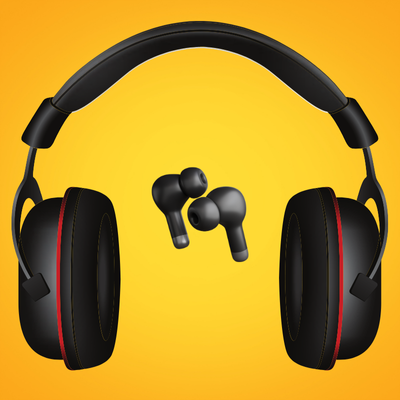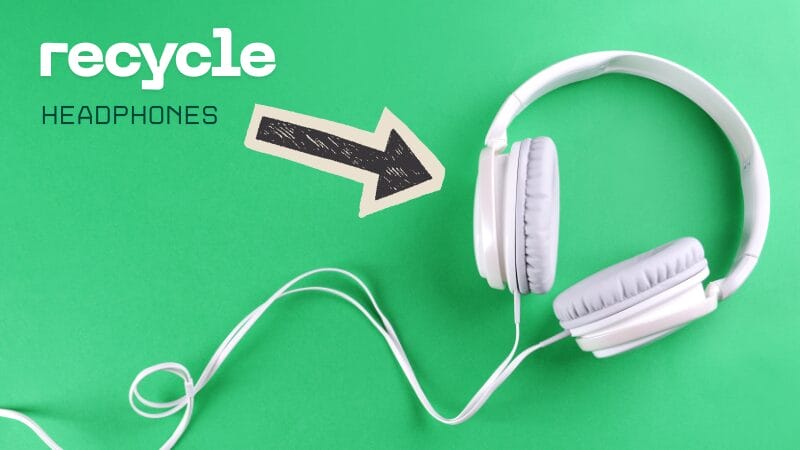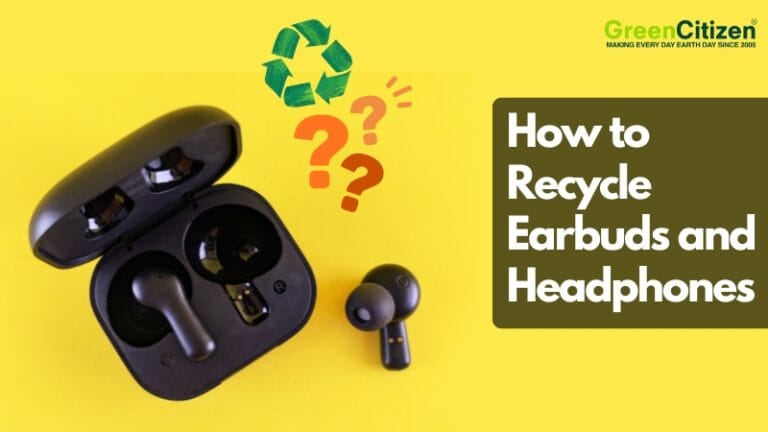If you’ve ever owned a pair of headphones or earbuds, you know the story — one side suddenly goes silent, the sound fades, or your wireless earbuds start dying after barely an hour of playback. Devices from brands like Apple, Beats, Bose, Sony, JBL, and Skullcandy are used daily, but they rarely last more than a few years.
Because these devices are small and inexpensive, most people simply buy new ones instead of repairing them. Multiply that by millions of users, and it adds up to a mountain of electronic waste that often ends up in landfills or incinerators.
That’s why proper recycling matters. Earbuds and headphones contain valuable materials like copper wire, aluminum, magnets, and plastic enclosures, along with potentially harmful batteries and resins. When recycled through certified e‑waste programs, these materials can be safely recovered — keeping toxic waste out of the environment and putting resources back into circulation.
💡 Key Takeaway: How to Recycle Earbuds and Headphones
You can recycle earbuds and headphones by taking them to certified e-waste recyclers that handle small electronics — not your regular recycling bin. These facilities safely recover metals, plastics, and batteries, preventing toxic waste and microplastic pollution.

Recycle Your Earbuds and Headphones with GreenCitizen
Drop them off at our Burlingame EcoCenter or schedule a certified pickup anywhere in the Bay Area. Fast, responsible, and R2-certified.
Are Earbuds and Headphones Recyclable?
Yes — earbuds and headphones are recyclable, but they must be handled through certified e-waste channels. Many people assume earbuds and headphones aren’t recyclable — and that doubt makes sense.
These devices are small, often mixed with different materials, and don’t seem to fit into any clear recycling category. They’re not paper, plastic bottles, or aluminum cans.
So people either toss them in the trash or leave them in drawers.
There are a few common reasons for this confusion:
- They’re too small — Most people think something as tiny as a pair of earbuds can’t be separated or processed.
- They’re made of mixed materials — Plastic shells, rubber cords, metal drivers, and sometimes batteries all fused together make them seem unrecyclable.
- There’s no recycling label — Unlike bottles or packaging, these devices rarely show a recycling symbol, so users don’t know what to do.
But here’s the truth: Yes, they are recyclable — just not through your household recycling bin.
What About Wireless and Noise-Cancelling Headphones?
Wireless and Bluetooth earbuds, like AirPods or Galaxy Buds, often contain built-in lithium batteries and mini circuit boards, which require special handling. These batteries can pose a fire hazard if crushed, so they’re separated before processing.
Noise-cancelling headphones, on the other hand, typically include additional internal electronics and are often bulkier, making them easier to dismantle in recycling facilities.
And if you’re wondering about wired vs. wireless recyclability — both can be recycled. The main difference is that wireless models require battery extraction, while wired headphones are usually processed more directly during shredding and material separation.
How Do Recycling Facilities Recycle Headphones?
At certified e-waste recycling centers, earbuds and headphones go through a multi-step process:
- Manual Sorting — Devices are sorted by type (wired vs. wireless, size, battery type).
- Battery Removal — Lithium-ion batteries (in wireless models) are safely extracted and sent to battery-specific recycling streams.
- Shredding & Separation — The remaining material is shredded, and magnets, copper coils, plastics, and aluminum are separated using density, eddy current, and magnetic sorting.
- Material Recovery — Usable metals and plastics are recovered and sent to manufacturers for reuse.
Even the tiny copper wire in an old headphone cable has value — when processed at scale.

How to Recycle Earbuds and Headphones (Step-by-Step)
To recycle headphones and earbuds properly, keep them intact, find a certified e-waste recycler, and package them for safe drop-off. You don’t need to take anything apart — just follow these quick steps.
Step 1: Keep the Device Intact
Do not try to remove batteries or open the casing — especially for wireless earbuds or noise-cancelling headphones. These contain lithium-ion cells that can be hazardous if punctured. Let certified recyclers handle disassembly.
For wired headphones, just untangle and loosely coil the cables to prevent damage or knots during transport.
Step 2: Find a Certified E-Waste Recycler
Headphones and earbuds are considered electronic waste — not general recyclables. That means you need to bring them to a facility that handles e-waste.
- Use the Green Directory to search by ZIP code
- If you’re in the Bay Area, GreenCitizen EcoCenter accepts both wired and wireless models
- Check if your city holds e-waste collection events or has a local drop-off station
Step 3: Package Them Properly
Because earbuds are small, they can easily get lost or mixed with other waste.
- Place them in a labeled envelope, pouch, or small box
- If you’re recycling multiple pairs (schools, offices, classrooms), group them in one container
- No need for fancy packaging — just make sure they’re clearly marked for electronics recycling
⚠️ Bonus Tip: Don’t Go for Curbside Recycling
Throwing headphones into your blue bin can do more harm than good. They won’t be processed, and the wires can jam machinery in sorting facilities. Always bring them to a proper e-waste program.
Where to Recycle Earbuds and Headphones Near You
If you’re wondering where to recycle earbuds or headphones near you, the best answer is through a certified e-waste recycler — not a curbside bin or general recycling drop-off.
Certified recyclers have the equipment, safety protocols, and verified downstream partners to ensure every device is responsibly processed and tracked from collection to recovery.
1. Certified E-Waste Recyclers (The Best and Safest Option)
Certified recyclers — especially those with R2 (Responsible Recycling) or e-Stewards certification — follow strict environmental and worker-safety standards. They dismantle headphones and earbuds in controlled facilities, recover usable materials, and safely dispose of hazardous components like batteries or resin composites.
When you choose a certified recycler:
- Hazardous materials are handled under environmental compliance.
- Reusable metals and plastics are extracted for remanufacturing.
- Every step is traceable through chain-of-custody documentation.
📊 According to the UN Global E-Waste Monitor, about 22.3% of small electronics like earbuds and headphones are properly recycled — making certified recyclers the most reliable option.
2. Municipal E-Waste Collection Points (Good Backup Option)
If a certified recycler isn’t nearby, many cities and counties run periodic e-waste collection events or host permanent collection points at local waste facilities.
These programs usually partner with approved recyclers, though the processing quality can vary. Always check if the event mentions certified downstream partners or follows state e-waste guidelines.
3. Retailer Take-Back Programs (Limited and Inconsistent)
Some retailers — like Apple, Best Buy, or Staples — offer take-back or trade-in programs that sometimes accept headphones and earbuds.
However, acceptance rules differ by brand, condition, and location.
For example:
- Apple’s Trade-In Program mainly targets newer devices like iPhones, iPads, and AirPods, not generic headphones.
- Best Buy limits small accessories depending on store capacity and state laws.
- Many stores don’t accept broken or non-branded items, which leads to confusion and frustration.
While these programs are convenient, they’re not always comprehensive or transparent about what happens after collection. If you want to ensure responsible recycling with documented tracking, certified e-waste recyclers remain the better choice.
Does GreenCitizen Offer Headphone Recycling?
Yes — GreenCitizen accepts both headphones and earbuds for recycling through our Bay Area EcoCenter drop-offs, nationwide mail-in program, and business pickup services.
Whether you have a single broken headset or a box full of old office earbuds, we ensure every item is handled responsibly — never landfilled or shipped overseas.
At our EcoCenters in Burlingame, you can drop off most small audio devices, including wired and wireless headphones. For organizations with larger volumes, GreenCitizen also offers scheduled business pickups across the Bay Area with full chain-of-custody tracking and recycling certificates.
If you’re outside the Bay Area, our mail-in recycling service lets you send in electronics for responsible processing from anywhere in the U.S. Simply package your items securely, fill out the mail-in request form, and we’ll take care of the rest.
No matter which option you choose, GreenCitizen ensures that every component — from plastic housings to tiny copper wires — is processed at certified recycling facilities that meet strict environmental and worker-safety standards.

Recycle Your Earbuds and Headphones with GreenCitizen
Drop them off at our Burlingame EcoCenter or schedule a certified pickup anywhere in the Bay Area. Fast, responsible, and R2-certified.
Can You Recycle Broken or Old Earbuds?
Yes — broken or old earbuds can still be recycled. Even if they no longer work, recyclers can separate and recover valuable materials like copper, aluminum, and plastic from inside each unit.
What you shouldn’t do is toss them into your household recycling or trash. Wires and small batteries inside earbuds can jam sorting machines or spark fires when crushed in compactors. That’s why they must go to a certified e-waste recycler instead.
At proper recycling facilities, earbuds are collected, sorted, and shredded. Machines then use magnetic and density-based separation to pull out metals and plastics for reuse. The result? Far less waste and far more materials returned to the manufacturing stream.
Why Earbud and Headphone Recycling Matters
Each year, consumers buy over 150 million pairs of earbuds and headphones, creating more than 40,000 tons of electronic waste once those devices reach end of life. Because they’re small, lightweight, and often mixed with plastics, metals, and batteries, most never make it to proper recycling channels — they simply vanish into drawers or landfills.
That small-scale disposal adds up to a major global issue.
When headphones and earbuds are thrown away:
- Metals like copper, nickel, and aluminum are lost — driving more mining and resource depletion.
- Plastic housings can fragment into microplastics, polluting soil and waterways.
- Embedded lithium batteries in wireless models risk fire or chemical leakage in landfills.
Recycling isn’t just about keeping waste out of landfills — it’s about closing the loop on valuable materials and preventing new environmental damage.
GreenCitizen’s Role in Responsible Recycling
At GreenCitizen, every device we collect — from large office servers to the smallest earbuds — is processed under our Total Accountability Management System (GTAMS). This proprietary system ensures complete transparency and traceability throughout the recycling process.
Here’s how it works:
- Every item is logged, tracked, and processed through secure handling stages.
- Certified downstream partners recover usable metals and plastics under R2 and e-Stewards standards.
- Businesses receive recycling certificates and ESG reporting data, helping them meet sustainability and compliance goals.
By choosing a certified recycler like GreenCitizen, you’re not just disposing of an old pair of headphones — you’re contributing to a measurable, verifiable reduction in global e-waste.

Recycle Your Earbuds and Headphones with GreenCitizen
Drop them off at our Burlingame EcoCenter or schedule a certified pickup anywhere in the Bay Area. Fast, responsible, and R2-certified.
FAQs about Earbud and Headphone Recycling
Not in your curbside bin. Headphones contain mixed materials — wires, magnets, and batteries — that curbside facilities can’t process. Take them to an electronics recycling center or drop-off site that handles small e-waste items instead.
Yes, but Apple’s in-store recycling program mainly supports newer devices like AirPods, iPhones, and Macs. For older or broken wired models, it’s better to use a certified e-waste recycler to ensure proper material recovery and compliance with environmental standards.
Most recyclers don’t pay for small electronics like headphones, but some programs offer trade-in credits or discounts for working devices. If you want environmental impact rather than compensation, certified recycling is still the most responsible route.
Not in household recycling. Earbud charging cases contain batteries and mixed plastics that need specialized processing. Bring them to an e-waste recycler or include them with your earbuds when you drop them off together.
Recycle both — just handle them slightly differently.
- Wired headphones: Coil cables neatly and drop off as-is.
- Wireless or noise-cancelling models: Keep them intact so recyclers can safely remove the embedded batteries.
Conclusion: Every Pair Counts
Earbuds and headphones may be small, but together they represent tens of thousands of tons of e-waste each year. Most end up forgotten in drawers or dumped in landfills — even though nearly every part of them can be safely recovered and reused.
Recycling them properly helps conserve metals, reduce mining, and prevent battery and microplastic pollution. And when you choose a certified e-waste recycler like GreenCitizen, you ensure that every item is processed ethically, locally, and transparently — never shipped overseas or discarded unsafely.
Whether it’s a pair of broken wired headphones or aging Bluetooth earbuds, take a minute to recycle them the right way. Every pair recycled is one less in a landfill — and one small step toward a cleaner, more sustainable tech future.
